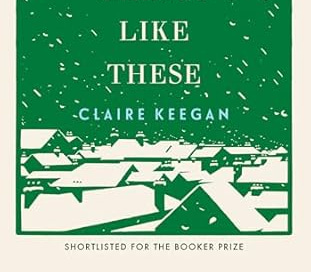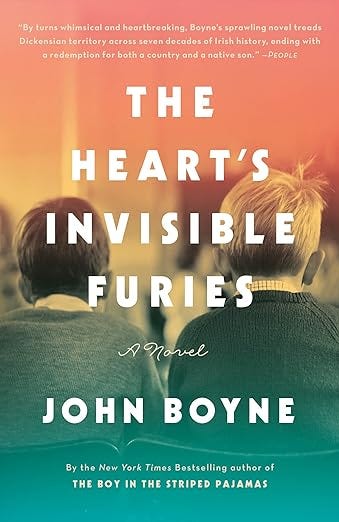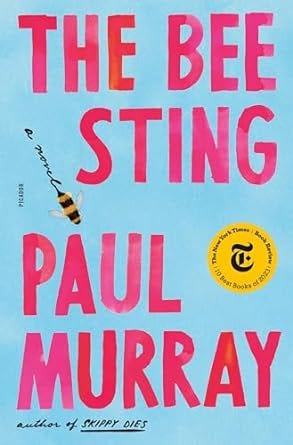What makes a book compelling? Join me in developing our “Eyes and Ears” for finding compelling stories.
What is it about Ireland that drives many of its talented authors to write heart-wrenching stories? Only slightly more populous than Louisiana, the Catholic Irish could learn a thing or two from the Catholic Cajuns about how to enjoy life.
Claire Keegan’s atmospheric Small Things Like These, at a third the length of a typical novel, reads fast, yet weighs heavy. Raised by a single mother, Furlong works hard for his wife and five daughters, delivering coal. Furlong lives in 1980’s Ireland, where the Catholic Church is still intertwined with daily life. One of Furlong’s customers is the convent on the hillside overlooking the town. The convent runs a Magdalene laundry, named after the mother of Jesus, but the fallen women who work there would be hard pressed to find Mary or her son within the walls.
Furlong stumbles into a first-hand experience with some of the locked-in laundresses. Here’s Furlong after experience, struggling to be a good Catholic:
The Mass, that day, felt long. Furlong didn’t join in so much as listen, distractedly, while watching the morning light falling through the stained-glass windows. During the sermon, his gaze followed the Stations of the Cross: Jesus taking up his cross and falling, meeting his mother, the women of Jerusalem, falling twice more before being stripped of his garments, being nailed to the cross and dying, being laid in the tomb. When the consecration was over and it came time to go up and receive Communion, Furling stayed contrarily where he was, with his back against the wall.
I read the above passage fast. Sensing I missed something, I reread it and discovered one of the most powerful scenes in literature. Furlong looks anew at the familiar suffering leading to the Crucifixion, reflecting his own struggle against the very institution enshrining Jesus’s.
What can one man do against an institution that has its hands in everything? The story culminates in the small thing Furlong does, an act of bravery that speaks more loudly now as social media makes us forget that actions speak louder than posts.
This one courtesy of
: John Boyne’s The Heart’s Invisible Furies, a story also taking to task the Catholic Church. We often forget how judgmental some churches are, casting out without hesitation those who have broken the rules, instead of trying to steer them and Boyne shines the light on the consequences. Cyril is adopted by parents who are unloving and need a trophy-son. Even though he doesn’t know who his mother is, we meet her at the beginning, in one of the best opening lines:Long before we discovered that he had fathered two children by two different women . . . Father James Monroe stood on the altar of the Church of Our Lady, Star of the Sea, in the Parish of Goleen, West Cork, and denounced my mother as a whore.
The sixteen-year-old sits with her family, as she does every Sunday, when she hears:
“Catherine Goggin, there you are,” said the priest, smiling at her and beckoning her forward. “Come on up here to me now like a good girl.”
Hoo boy, it’s about to get nasty for poor Catherine, who’s not yet showing and who’s never left the little village she grew up in. This won’t be a short, impersonal denunciation. We see how she manages and how her son comes-of-age in a country that’s harshly cast his mother on the rubbish heap and wants to do the same to him.
Paul Murray’s The Bee Sting lightens things, taking us behind closed doors to watch a family who worships money.
Told from the points of view of each family member, we start with the teen-aged daughter, Cass, who thinks she doesn’t look as good as her friend Elaine:
Elaine had golden hair, green eyes, a perfect figure. When she bought clothes online, they always fitted perfectly, as if they’d been made with her in mind. . . Even when she was clipping her toenails, she looked like she was eating a peach.
Cass admires Elaine’s ambition. Elaine wants to compete in Miss Universe Ireland, not for the title, but the opportunities; last year’s winner served as brand ambassador for a juice company.
You might guess Cass’s family isn’t bound by love or respect. What happens when the family business fails, shutting off the money spigot?
Fair warning though. The cover and beginning lead one to believe the whole novel stays light-sided, but it’s anything but. Deeply interior, it descends into the canyons of its characters. Nobody uses quotes to mark dialog. Imelda, the mother and wife, goes a step further and omits punctuation, providing her narrative with an unhinged flavor.
Thanks to
for recommending.Read one or all three and you’ll wonder why it ever was called the Emerald Isle.
All the Best,
Geoff
If you enjoyed this post, please hit the heart “❤️” so others can find it. It’s at the bottom and at the top.







Geoff, "Small Things Like These" is fab.